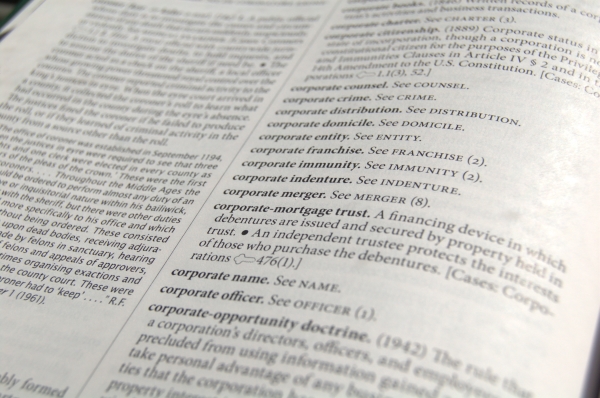 What is a Corporate Lawyer?
What is a Corporate Lawyer?
“Corporate lawyer” means one of two different things: (1) a lawyer who primarily practices corporate law or (2) a lawyer who works for a corporation. A lawyer who works for a corporation is also sometimes called an “in-house lawyer.” Many in-house lawyers, however, do not practice corporate law. For example, an in-house lawyer tasked solely with supporting a Human Resources department is practicing Labor & Employment Law, not Corporate Law.
What is Corporate Law?
Corporate Law, or “Corporations Law” as it’s sometimes called, is law that relates to the formation, governance, ownership, acquisition, liability, and dissolution of corporations. This is the simplest and most accurate definition I could come up with, having read dozens (and having practiced corporate law for many years!). I would have provided the definition from Black’s Law Dictionary but when I referenced it…well, have a look for yourself:

What is Corporate Law not?
Despite what hundreds of websites (erroneously) say, Corporate Law is not Business Law, or perhaps it’s more accurate to say that Corporate Law is a subset of Business Law. People use Corporate Law, Commercial Law, and Business Law interchangeably, and this is wrong. Wikipedia’s definition of Corporate Law is utterly abysmal and laughably broad. Outside the United States, you will sometimes see Corporate Law referred to as “Company Law” or “Enterprise Law.”
What is a Corporate Lawyer not?
It depends on which of the two definitions of Corporate Lawyer you’re working with.
For an in-house lawyer, a Corporate Lawyer can be literally any type of lawyer because “Corporate” in that definition is simply referring to who their sole client (and employer!) is, a corporation. You could have an in-house lawyer who only practices a very narrow subset of Intellectual Property law within a corporation and they are a Corporate Lawyer.
For the other definition, that of a lawyer who primarily practices Corporate Law, a Corporate Lawyer is not a Business Lawyer if their practice is narrowly focused on corporate law to the exclusion of other areas of law that fall within the definition of Business Law.
A likely source of confusion over the definition of Corporate Lawyer is that Business Lawyers often spend a lot of their time practicing Corporate Law. The same can be said of Business Lawyers and Commercial Law. This might explain why the three terms are so often conflated in the minds of the public.

What types of problems do Corporate Lawyers help their clients with?
Corporate Lawyers who practice corporate law
Corporate Lawyers who practice corporate law are often the very first type of attorney a business founder will hire because these Corporate Lawyers specialize, in part, in incorporating corporations and other legal entities. During the founding of a corporation a Corporate Lawyer is responsible for preparing all of the documents that found the corporation, namely:
- Certificate of Incorporation
- Bylaws
- Action by Written Consent of Sole Incorporator
- Initial Action by Board of Directors
- Common Stock Certificate
In addition, a Corporate Lawyer might prepare some or all of the following in connection with setting up a corporation (C-corp):
- Assignment Agreement (for the IP contributed by the founder(s))
- Secretary’s Certificate Regarding the Bylaws
- Employee Confidential Information and Inventions Assignment Agreement
- Indemnification Agreement (of Founder)
- Stockholder Consent of Indemnification Agreement (of Founder)
- Restricted Stock Purchase Agreement
- Section 83(b) Election (tax-related document)
The documents prepared by a Corporate Lawyer will vary depending on the circumstances and depending on the corporate form of the company (C-corp, LLC, S-Corp, limited partnership, PLLC, etc.).
Corporate Lawyers who practice corporate law are also typically adept at what’s called corporate governance. This includes things like preparing board meeting notices and agendas, conducting board meetings, and otherwise executing on all of the administrative and legal tasks called for by the constating documents.
Corporate Lawyers who practice corporate law also assist corporations in fundraising and selling and assigning and transferring ownership interests in corporations more broadly.
Corporate Lawyers who practice corporate law also typically assist clients with mergers and acquisitions (“M&A”). M&A is the area of law that deals with one company buying another, or merging into another, or spinning off another. M&A law is such a robust area of the law that it’s not uncommon for a Corporate Lawyer to specialize solely in M&A itself, to the exclusion of other areas of the law, including other areas of corporate law itself. These corporate lawyers accomplish different types of transactions, including mergers, acquisitions, asset purchases, tender offers, and consolidations.

Corporate Lawyers who are in-house counsel
Because Corporate Lawyers who are in-house counsel can be almost any type of lawyer practicing almost any type of law, these Corporate Lawyers solve a huge variety of problems for their client corporations. In fact, it’s easier to identify the types of law these Corporate Lawyers don’t practice, and that would include Family Law (including Divorce Law), Estate Planning, Municipal Law, and Constitutional Law. Even Immigration Law and Arts & Entertainment law might be practiced by in-house counsel Corporate Lawyers, depending on the industry the client corporation is in and the size and complexity of its business.
When should I hire a Corporate Lawyer?
You should consider hiring a Corporate Lawyer if you have an opportunity or challenge that Corporate Lawyers excel at taking advantage of or solving. We regularly assist clients with corporate law-related matters and you are welcome to contact us for a free consultation to discuss your opportunity or challenge.
If you are looking to found a business, you’ll want to hire a Corporate Lawyer or a Business Lawyer who practices corporate law to assist you in forming the company, preserving intellectual property, and shielding you from liability.
If you are looking to raise money for your already-established business, a Corporate Lawyer can take care of all of the contracts and other legal documents needed to do so safely and effectively. In addition, a Corporate Lawyer who assists companies in raising money will often have a professional network that might include angel investors, venture capital firms, and other types of lawyers, all of whom make up an ecosystem of stakeholders that support money-raising for businesses; this is another value-add a good Corporate Lawyer can provide to clients (viz., making warm introductions to other stakeholders in that ecosystem, each of whom might have something to offer the business client).

Why does the term, Corporate Lawyer, sometimes seem to have negative connotations?
I am not an expert in lawyer jokes by any means, but I can offer some speculation here. Again, I think it’s important to remember that Corporate Lawyer can mean one of two different things.
Let’s start with in-house lawyers. I think in-house lawyers might sometimes get a bum rap because their job duties can call for them to perform certain tasks that the general public might find objectionable. For example, whose job is it to draft a website’s Privacy Policy that gives the company owning the website the ability to collect personal data about an end user visiting the website (e.g., a member of the public) for the purpose of selling that personal data to other companies? That would be, typically, an in-house lawyer. Similarly, internal investigations, which are investigations a company does to itself for the purposes of discovering the facts around some sort of mishap or misdeed, are often conducted by in-house lawyers. In that context, the in-house lawyer is serving the interests of their client, the company (just as they are supposed to). An employee being interviewed in that context is supposed to receive what’s called an Upjohn warning prior to the interview. The primary purpose of the Upjohn warning is to remind the employee that the lawyer is looking out, not for the employee’s best interests, but the best interests of the lawyer’s client, the company, and to serve as a corporate analog to aspects of a Miranda warning. While the Upjohn warning is, objectively, a good thing, it, and the broader context of a coworker interviewing another coworker, could be the source of some of the criticism leveled at Corporate Lawyers.
As for the other type of Corporate Lawyer, the one who practices primarily corporate law, I can’t see as much of a case for negative connotations. The only thing that comes to mind is perhaps the M&A work that these Corporate Lawyers do. For example, corporate raiders, such as Al Dunlap, have suffered a lot of criticism over the years; while not directly responsible for the alleged damage done to certain companies in the context of a corporate raid, Corporate Lawyers are the primary tool of a corporate raider in carrying out their designs – so, guilt by association essentially.
How much do Corporate Lawyers charge?
The hourly rates of Corporate Lawyers vary widely. As a general matter, a Corporate Lawyer providing M&A services or capital raising services will likely charge more than a Corporate Lawyer providing incorporation or corporate governance services.

I am about to join a Board of Directors for the first time, should I consult a Corporate Lawyer?
Yes, if you are interested in learning about your rights and obligations as a Director and in avoiding liability. Even though they aren’t employees, Directors get sued all the time. There are thousands of examples of Directors getting sued out there. A good Corporate Lawyer can educate you about the Duty of Loyalty and Good Faith and the Duty of Care, as well as options for indemnitees and insurance to protect directors. Remember, the only lawyer who is looking at for your best interests is the one you hire; a lawyer hired by the company is required to serve the best interests of the company, not yours.
When should I hire a Corporate Lawyer versus another type of lawyer?
As mentioned above, because the Internet is generally confused about the definition of corporate lawyer it can be difficult to find a lawyer on the Internet who actually practices corporate law and is not simply a commercial lawyer or a business lawyer who is advertising themselves as a corporate lawyer. Lawyers and law firms will use the term, “Corporate Lawyer,” as a synonym for a lawyer who practices business law or commercial law not because that’s the correct use of the term but because of the general confusion and conflation in the minds of the public when it comes to the term, Corporate Lawyer. If you think you are in need of a Corporate Lawyer you can certainly search for a Corporate Lawyer on Google or a lawyer directory like Justia. When you get to that law firm or that lawyer’s website your best bet is to simply read about the specific tasks or matters that they assist their clients with and that will help you determine whether or not the lawyer or law firm you are looking at practices corporate law or is using “Corporate Lawyer” in a loose sense.
I am thinking of selling my company, should I consult a Corporate Lawyer?
Yes, this is exactly the type of thing that a Corporate Lawyer assists clients with; you could also find a business lawyer who practices corporate law as part of their practice and they will likely be able to assist you in selling your business or in assessing your options when it comes to selling your business.

Are there some real-life examples of famous Corporate Lawyers? What about in fiction?
I’m embarrassed to say that I do not know of any Corporate Lawyers who are or were famous. Perhaps there are some and folks can leave them in the comment section. As for fiction, the only thing that comes to mind is the movie, The Social Network. I have not seen the movie myself and am not particularly familiar with Facebook’s history, but I believe the movie dealt with company ownership issues like share dilution, and that’s the province of Corporate Lawyers. You can imagine why Corporate Lawyers would be sparse in fiction – again, they specialize in the formation, governance, ownership, acquisition, liability, and dissolution of corporations. These are not the kinds of things that are easily dramatized or particularly entertaining. Sure, you could have litigation related to these things, such as in The Social Network, but even with the flair of courtroom scenes, the underlying subject matter, for example who owns how much of a given company, is just not compelling in film for a broad audience.